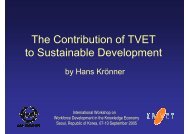Learning for Life, Work and the Future Initial ... - Unesco-Unevoc
Learning for Life, Work and the Future Initial ... - Unesco-Unevoc
Learning for Life, Work and the Future Initial ... - Unesco-Unevoc
You also want an ePaper? Increase the reach of your titles
YUMPU automatically turns print PDFs into web optimized ePapers that Google loves.
Page 80 Participants’ Papers <strong>Learning</strong> <strong>for</strong> <strong>Life</strong>, <strong>Work</strong> <strong>and</strong> <strong>the</strong> <strong>Future</strong><br />
3. Integrated Training <strong>for</strong> Entrepreneurship<br />
Promotion (INTEP)<br />
INTEP is a target group-oriented training facilitation.<br />
Among <strong>the</strong> components of <strong>the</strong> VET concept, this one<br />
has been initiated most recently. The objective is to<br />
create training offers which target existing MSE<br />
operators within <strong>the</strong> in<strong>for</strong>mal sector <strong>and</strong> with a special<br />
focus on gender balance. Slightly different from <strong>the</strong><br />
CBET concept, <strong>the</strong> target group is taken as a starting<br />
point from which local <strong>and</strong> regional market options<br />
<strong>and</strong> employment opportunities are assessed.<br />
For <strong>the</strong> development of INTEP packages <strong>the</strong> following<br />
aspects must be taken into account:<br />
Desired geographic scope. For <strong>the</strong> purpose of developing<br />
training offers geared to <strong>the</strong> needs of <strong>the</strong> in<strong>for</strong>mal<br />
sector, a local or, at most, regional perspective<br />
seems most suitable. However, even if <strong>the</strong> major focus<br />
is on <strong>the</strong> local level, an efficient linkage between local<br />
producers <strong>and</strong> <strong>the</strong> regional markets should be taken<br />
into account as a decisive criterion <strong>for</strong> <strong>the</strong> prospect of<br />
local initiatives.<br />
Situation of labour <strong>and</strong> goods market. In order to<br />
ensure employment effectiveness, <strong>the</strong> labour market<br />
<strong>and</strong> technological situation in <strong>the</strong> environment of <strong>the</strong><br />
target groups have to be observed <strong>and</strong> market niches or<br />
trends of saturation identified.<br />
Characteristics of <strong>the</strong> target group. The analysis<br />
should focus on <strong>the</strong> socio-economic environment in<br />
which <strong>the</strong> individuals <strong>and</strong> groups live, as well as<br />
characteristics such as age, sex, education, work<br />
experience, educational <strong>and</strong> training background,<br />
interests <strong>and</strong> ambitions. This has to be assessed<br />
through analysis <strong>and</strong> thorough dialogue with <strong>the</strong> group.<br />
Existing local training institutions <strong>and</strong> support<br />
structure. The review should lead to an overview of<br />
level of qualifications, training location <strong>and</strong> duration,<br />
training cost, certification, <strong>the</strong> balance between <strong>the</strong>ory<br />
<strong>and</strong> practice, <strong>the</strong> number of trainees, <strong>and</strong> <strong>the</strong> recruitment<br />
of trainers. In many cases it may be necessary to<br />
include qualification <strong>and</strong> support <strong>for</strong> <strong>the</strong> planners,<br />
facilitators <strong>and</strong> trainers of those institutions.<br />
4. Trials<br />
Following <strong>the</strong> development of this methodology, initial<br />
trials were carried out in several regions of Tanzania to<br />
pave <strong>the</strong> way <strong>for</strong> situation-specific replication of <strong>the</strong><br />
methodology. It was <strong>the</strong> intention of <strong>the</strong> pilot programme<br />
to reach target groups with low levels of education<br />
<strong>and</strong> to give a special thrust to <strong>the</strong> development<br />
of training options <strong>for</strong> girls, women <strong>and</strong> youths.<br />
For <strong>the</strong> pilot phase, <strong>the</strong> field of preservation, storage<br />
<strong>and</strong> processing of food was identified as an area of<br />
untapped marketing opportunities. For <strong>the</strong> curriculum<br />
planning process, competent institutions were identified<br />
that were interested in participating <strong>and</strong> competent<br />
to do so. Planning teams consisting of representatives<br />
of different training providers, individuals with<br />
experience in planning, training <strong>and</strong> food processing,<br />
as well as in marketing <strong>and</strong> packaging, designed <strong>the</strong><br />
specific training programmes following a special<br />
methodology.<br />
On <strong>the</strong> basis of <strong>the</strong> above insights, an INTEP programme,<br />
including a curriculum outline <strong>and</strong> training<br />
areas <strong>and</strong> features, was designed. The matching of <strong>the</strong><br />
needs <strong>and</strong> qualifications of <strong>the</strong> target groups with <strong>the</strong><br />
dem<strong>and</strong>s of markets <strong>for</strong> labour <strong>and</strong> goods was<br />
essential.<br />
In order to reach <strong>the</strong> identified target groups, VETA<br />
aimed at enabling those institutions with new competencies<br />
to function as initiators <strong>and</strong> implementers of<br />
such tailor-made training programmes. Summarised,<br />
<strong>the</strong> services delivered by VETA/GTZ were:<br />
• Training of VETA staff as facilitators<br />
• Targeting of beneficiaries (selection/approval of<br />
suggested target groups)<br />
• Improving <strong>the</strong> qualifications of training providers in<br />
planning <strong>and</strong> implementation of training<br />
• Development of training packages<br />
• Financing, co-ordination <strong>and</strong> evaluation of pilot<br />
programmes<br />
• Streng<strong>the</strong>ning links to o<strong>the</strong>r relevant service providers<br />
(micro finance, business counselling, etc.).<br />
The approach seems to be promising, as <strong>the</strong> costs<br />
involved are relatively low. The advantage of it is that<br />
curricula are not st<strong>and</strong>ardised <strong>and</strong> <strong>the</strong>re<strong>for</strong>e can be<br />
readily adapted to local circumstances. First experiences<br />
also show that women’s strategic training needs<br />
with regard to employment promotion can be quite<br />
easily catered <strong>for</strong> with this approach.<br />
However, such a planning methodology is much more<br />
difficult to manage than supervising <strong>the</strong> implementation<br />
of a st<strong>and</strong>ard curriculum. Qualified trainers have<br />
to be identified <strong>for</strong> <strong>the</strong> “new skills” to be imparted to<br />
<strong>the</strong> target groups. The financial sustainability also<br />
seems difficult to achieve; in particular, if it is a<br />
defined goal of <strong>the</strong> programme to reach poorer<br />
segments of <strong>the</strong> society. Although <strong>the</strong> participants are<br />
expected to pay fees <strong>for</strong> <strong>the</strong> programmes, <strong>the</strong>ir<br />
contribution is still very low. A political decision will<br />
have to be taken as to which funds will be made<br />
available to subsidise <strong>the</strong>se training programmes <strong>for</strong><br />
<strong>the</strong> more vulnerable groups.<br />
5. Strengths<br />
INTEP is a suitable approach to supplement <strong>the</strong><br />
<strong>for</strong>malised vocational education <strong>and</strong> training designed





